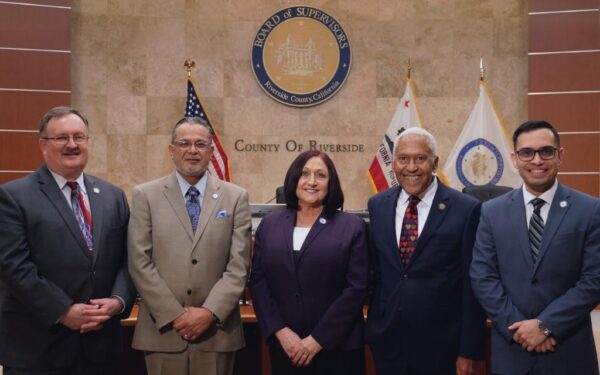The Board of Supervisors on Tuesday tentatively approved an $8.61 billion budget for Riverside County government in fiscal year 2023-24, with greater appropriations to fund public safety projects and reopen an animal shelter.
The board held hearings on the proposed budget during the second week of June and received multiple requests for outlays beyond what had originally been proposed for departments. The supervisors ultimately agreed to $25.3 million in additional funding obligations.
Even with the increases, the budget remains structurally balanced, according to the county Executive Office.
Board Chairman Kevin Jeffries observed prior to the 5-0 vote that, in the decade he has served as a supervisor, the state’s under-funding of the mandated costs imposed on the county “has not changed.”
Jeffries said he has remained exacerbated by “the unequal treatment of the residents of Riverside County compared to other places in the state.”
“Compared to (other counties), the state has discriminated against inland residents,” he said. “We’re still where we are, and we’re not making headway in significant ways.”
His comments were mostly tied to health services and infrastructure. The chairman said he did not see any changes ahead without stronger action, possibly even litigation by the county.
Sheriff Chad Bianco testified during the hearings that he had a handful of needs unmet in the spending plan laid out by the Executive Office, which proposed $1.01 billion in expenditures, compared to $942 million in the current-year budget.
The sheriff said among the higher costs built into next year’s budget is an “enhanced management” policy that will put lieutenants in station-based supervisory roles, ensuring more sergeants are “out in the field with deputies.”
The board committed to providing $1.45 million to the effort.
Bianco also said he wanted to establish a permanent “problem-oriented policing” team to handle noise and party complaints, particularly on the weekends, largely in the unincorporated mountain communities and the Temecula Valley, where the majority of short-term rental properties in the county are located. Four deputies will be dedicated to the POP unit, plus at least four Department of Code Enforcement officers.
The board has committed $662,000 in support of the POP initiative in the new budget.
The sheriff did not request additional funds to fully open the John J. Benoit Detention Center in Indio, where just under 400 inmate beds are in use, out of a potential 1,600 available at the facility.
District Attorney Mike Hestrin requested $2.5 million more in the agency’s budget than was recommended by the EO, bringing his total ask to $191.14 million.
The board committed to $2.1 million in additional appropriations, mainly for establishment of a full-time call center to assist members of the community in need of assistance from the DA’s Office, as well as make 15 temporary employees permanent.
Hestrin listed a number of challenges weighing on the office, including the state Legislature’s mountain of new mandates and an ongoing departure of personnel, largely through retirements. The agency is down to 234 prosecutors — the lowest number in the last decade.
Fire Chief Bill Weiser originally sought $537 million in appropriations, with the EO recommending $457.3 million. The current-year budget is $443.4 million.
Some of the budgetary requirements he cited were expansion of the hazardous materials unit, the ongoing conversion of three fire stations from wildland outposts to municipal stations and bulking up staff at the Cabazon and French Valley stations to ensure a higher level of “surge staffing” is available for wildfire season.
The supervisors committed $5.7 million more to meet the fire department’s immediate needs.
The board also embraced a Department of Animal Services proposal to reopen the San Jacinto Valley Animal Campus, at a cost of $3.4 million.
The facility was shut down in fiscal year 2019-20 due to the department’s inability to overcome years-long budgetary shortfalls.
County CEO Jeff Van Wagenen said the proposed budget “creates the opportunity to enhance the efforts of our departments providing vital programs for our constituents countywide.”
The proposed budget is roughly 15% larger than the current year’s budget of $7.45 billion. Close to half of the appropriations comprise state and federal “pass-through” funds, over which the board has little to no control.
One of the highlights in the roughly 1,000-page budget report was the projection for reserve funds to reach $555 million by the end of 2023-24, compared to an estimated $537 million reserve pool projected at the close of the current fiscal year on Friday.
The new budget will be reassessed and likely adjusted in September, at the close of the state’s fiscal year.







